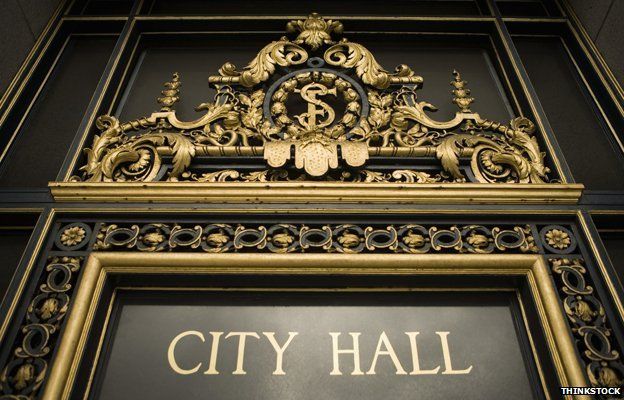Will mayors one day rule the world?
- Published

Hundreds of mayors are getting together to build a global network that could shift the balance of power and create a new force to be reckoned with.
Tousle-haired and enthusiastic Mayor Eberhard van der Laan welcomes his guests. Today he is not addressing Amsterdam's council members as usual, but his peers.
From across Europe and America, city mayors have accepted his invitation to help build an institution which, if successful, could transform the way we are governed: A Global Parliament of Mayors.
In the US, polls show that the level of public trust in Congress runs at a paltry 12%. Trust in American mayors, by contrast, runs at between 60% and 65%.
The man who makes that observation is sharing the platform with van der Laan. His sharp features and restless energy put one in mind of a small bird of prey, whose tenacity should never be underestimated.
Prof Benjamin Barber is the author of an intriguing book called If Mayors Ruled the World.
Most academics are like Karl Marx's philosophers, seeking only to interpret the world. But Barber has taken up the other half of Marx's dictum and is seeking to change it.
Now, mayors and local politicians the world over have taken up his call to arms and are on the verge of organising the first ever Global Parliament of Mayors.
The aim is to bring together some 600 mayors from around the world to London as early as next year, where they will announce themselves as a new political force - global in reach, local in experience and achievement.
Barber's thesis is compelling: Cities are the way of the future, whether we like it or not.
Through much of the 19th Century, one in 30 of us lived in cities. Now that figure is one in two. In Europe or Latin America, almost four people in five are urban dwellers.
Mayors running mega-cities like Istanbul, Dhaka or Sao Paulo have budgets far in excess of many countries. But they also have a whole range of problems - from potholes to gargantuan traffic jams - that need sorting out here and now.
Sao Paulo has some of the worst traffic congestion in the world
This means mayors usually have to evolve into very different beasts compared with national politicians - less ideological posturing and more problem solving. If they don't address their constituents' immediate problems concerning housing, transport, sewage and energy, it's simple - they don't get back into office.
Wandering from Amsterdam Centraal Station to the town hall - along the red-paved streets with those gorgeous tall houses that line the canals - it is, I think, rather hard to compare the struggles of Amsterdam to the problems of, say, Bogota in Colombia. Yet the mayor of Bogota, the country's capital, is one of the project's most fervent supporters.
Cooperation always yields results. London's cycle superhighways have been built in large part because Amsterdam and other European cities demonstrated conclusively that they cut energy consumption and increase fitness levels - everybody wins except the oil companies and the traffic wardens. What's not to like?
In the Netherlands, van der Laan explains that the major urban centres learned cooperation was the best way forward a long time ago.
So instead of competing with one another for resources and favours from central government, the country's big four cities - Amsterdam, Utrecht, The Hague and Rotterdam - now work together. Their accumulated clout means the government is now much more accommodating.
Barber argues that through cooperative networks, pragmatic mayors are in a much better position to solve even the big global problems - such as climate change or organised crime - than what he believes to be the tired old systems of the nation state and nationalism.
But this is no talking shop, pontificating about how much better life would be if mayors ruled the world. There is a surprise guest in the town hall, whose usual clients include The Rolling Stones, Queen, Led Zeppelin and Sting. Harvey Goldsmith, Britain's most successful rock concert impresario, is listening attentively to van der Laan and Barber.
Through a chance conversation, he has steadily become a committed supporter of the Global Parliament of Mayors and is prepared to put his considerable influence behind it. If city chiefs from around the world want to hold their inaugural parliament next year in London, Harvey Goldsmith is committed to making it happen.
Britain's politicians may be twisting themselves in knots over the issue of constitutional change since the Scottish referendum campaign. While they do, this group of can-do politicians may end up rewriting constitutions across the globe in the way they always have - by getting on with the job.
How to listen to From Our Own Correspondent, external:
BBC Radio 4: Saturdays at 11:30
Listen online or download the podcast.
BBC World Service: Short editions Monday-Friday - see World Service programme schedule.
Subscribe to the BBC News Magazine's email newsletter to get articles sent to your inbox.